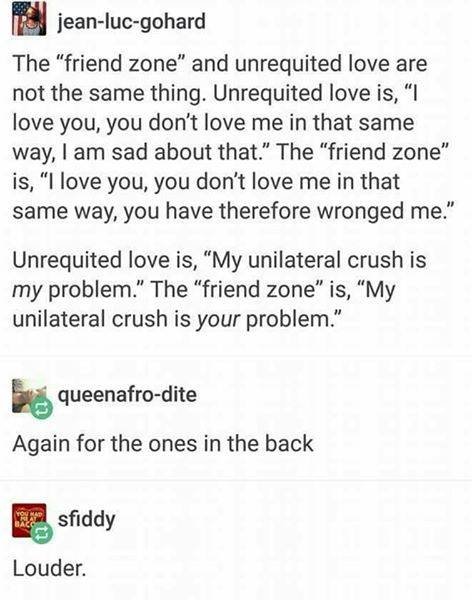"Friend Zone" and "Unrequited Love" are not the same thing.
Author's Note: this post was originally on my website, dated 08Mar2017.
Yesterday on social media, I saw this image, and reposted it with the comment "an important difference:"

After having posting this, a friend commented with a different perspective - that the term "Friend Zone" has multiple contexts. While the term can have other contexts, in a sociological sense, it has one meaning: the situation where a person, usually male, who desires a romantic relationship from someone, usually female, and is supposedly rejected. A Chicago Tribune Contributor wrote: "I've heard too many men complain, 'What is it with you women and this 'let's be friends' thing? If I have romantic interest in you, why would I want to be friends? I don't need any new friends.' (...) To clarify, I asked: 'So you're telling me that you'd rather not have me in your life at all than to have a platonic friendship with me?' 'Yep,' he said matter-of-factly. 'That's what I'm saying'" [1]. Another way to describe it is to say: "The friend zone is a forced platonic relationship. When one friend wants romance and another doesn’t, the former is in the friend zone. Women who put ‘nice guys’ in the friend zone were accused of abuse, manipulation, and neglect" [2].
If one does a Google Image Search for "Friend Zone," the initial results will show references and memes of men being friend zoned by women. Google also has a function where, when doing an image search, it gives you suggestions for additional search modifiers - the first one is "meme." When selecting this modifier, it gives more memes of men being friend zoned by women. These memes reinforce toxic behavior; that's to say, they they reinforce the idea that women put men into the "Friend Zone," and that this is undesirable. I will not post these images here, because I find them to be repugnant.

Sometimes people make their intensions for a romantic relationship known and are told that the interest is not shared. Other times, people use friendship as a way to get close to someone without being clear about what their intentions are, and then either get rejected or never make the other person aware that they are interested [4]. Either way, instead of accepting that the other person is not interested in a romantic relationship, the person who is supposedly put in the "Friend Zone" feels that they are put in "the penalty box of dating, when your only crime is not being buff and unobtainable" [3], where the idea that men's dominance over women is to be respected and ignores the harm that these ideas bring [2]. They feel that they are owed something for their love. Sadly, this is normalized in our society, starting from the history of women being treated as second-class citizens [6] [7], to the objectification of women in the media to sell products [8], to the continued pressure to maintain gender roles.
Now, I will agree that "Friend Zone," while toxic, is technically (and I stress technically) a form of "Unrequited Love," in that "Unrequited Love" is also a one-sided love that is not reciprocated. The word "Unrequited" is a 16th century adjective meaning 'not requited,' or 'reciprocated or returned in kind' [5]. Doctor Lindsey Doe has a wonderful video (watch it here) that talks about this, and also talks about ways to deal with "Unrequited Love," especially when it is harmful (both as the lover and as the loved). But the difference still remains: "my unilateral crush is your problem" versus "my unilateral crush is my problem."
If you like what you read here, and would like to show your support, please consider donating.
I am on Patreon to help fund the work that goes into maintaining a website and creating researched content. Also, it will give me some financial relief as I am also endeavoring to complete a number of science fiction and fantasy stories, and hopefully compile them into zines or collected works. As a sponsor, you'll get quality blog posts, early access to completed stories, and the knowledge that you are helping me fund the creative process. I will get the benefit of some stress reduction as I won't have to worry about finances as much anymore, and that will help me be free to create more work.
It's not always possible to sponsor on a monthly basis. If you would like to do a one time donation, please feel free to use PayPal, SquareCash, or Venmo. Producing content takes time and effort, and any support would be most appreciated. Your donations help me cover expenses and eventually will let me be able to create quality content full-time.
References:
B., Gina. "What's so bad about the friend zone?" Chicago Tribune. Bruce Dold, 12 Jan. 2007. Web. 08 Mar. 2017. http://articles.chicagotribune.com/2007-01-12/news/0701120408_1_new-friends-attraction-friendship.
Milner, Ryan M. "FCJ-156 Hacking the Social: Internet Memes, Identity Antagonism, and the Logic of Lulz." The Fibreculture Journal 22 (2013): n. pag. The Fibreculture Journal. The Fibreculture Journal Incorporated. Web. 8 Mar. 2017. http://twentytwo.fibreculturejournal.org/fcj-156-hacking-the-social-internet-memes-identity-antagonism-and-the-logic-of-lulz/.
Fine, Marshall. "HuffPost Review: Just Wright." Web log post. The Huffington Post. N.p., 10 May 2010. Web. 8 Mar. 2017. http://www.huffingtonpost.com/marshall-fine/huffpost-review-ijust-wri_b_569896.html.
Nicholson, Jeremy, M.S.W., Ph.D. "Avoiding the Friend Zone: Becoming a Girlfriend or Boyfriend." Psychology Today. Sussex Publishers, 01 Mar. 2013. Web. 8 Mar. 2017. https://www.psychologytoday.com/blog/the-attraction-doctor/201302/avoiding-the-friend-zone-becoming-girlfriend-or-boyfriend.
"Unrequited." Merriam-Webster. N.p., n.d. Web. 8 Mar. 2017. https://www.merriam-webster.com/dictionary/unrequited.
Muraskin, Roslyn. Women and justice: development of international policy. Amsterdam: Gordon and Breach, 1999. Google Books. Web. 8 Mar. 2017. https://books.google.com/books?id=JGOOAgAAQBAJ&printsec=frontcover&source=gbs_ge_summary_r&cad=0#v=onepage&q&f=false.
Garcia, Venessa, and Patrick M. McManimon. Gendered justice: intimate partner violence and the criminal justice system. Lanham, MD: Rowman & Littlefield Publishers, 2011. Google Books. Web. 8 Mar. 2017. https://books.google.com/books?id=nzsBGdv5E6YC&pg=PA7#v=onepage&q&f=false.
Frith, Katherine, Ping Shaw, and Hong Cheng. "The Construction of Beauty: A Cross-Cultural Analysis of Women's Magazine Advertising." Journal of Communication 55.1 (2005): 56-70. Web. 8 Mar. 2017. http://onlinelibrary.wiley.com/doi/10.1111/j.1460-2466.2005.tb02658.x/pdf.